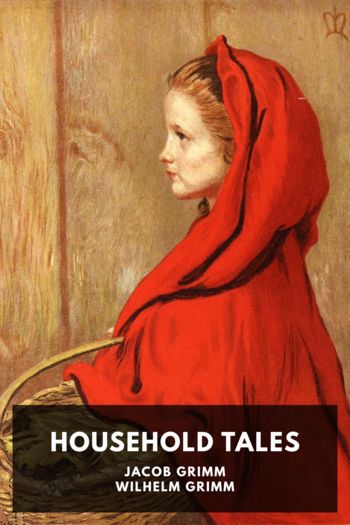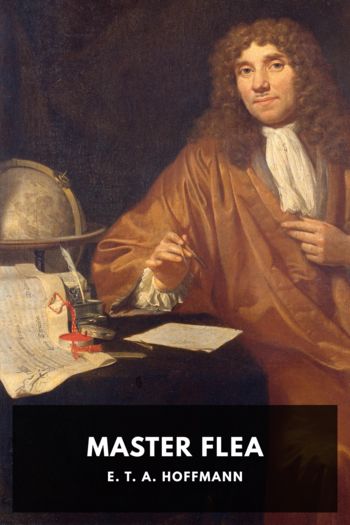Household Tales - Jacob Grimm (read me a book .txt) 📗

- Author: Jacob Grimm
Book online «Household Tales - Jacob Grimm (read me a book .txt) 📗». Author Jacob Grimm
When the hare therefore arrived in full career at the lower end of the field, the hedgehog’s wife met him with the cry, “I am here already!” The hare was shocked and wondered not a little, he thought no other than that it was the hedgehog himself who was calling to him, for the hedgehog’s wife looked just like her husband.
The hare, however, thought to himself, “That has not been done fairly,” and cried, “It must be run again, let us have it again.” And once more he went off like the wind in a storm, so that he seemed to fly. But the hedgehog’s wife stayed quietly in her place.
So when the hare reached the top of the field, the hedgehog himself cried out to him, “I am here already.” The hare, however, quite beside himself with anger, cried, “It must be run again, we must have it again.”
“All right,” answered the hedgehog, “for my part we’ll run as often as you choose.”
So the hare ran seventy-three times more, and the hedgehog always held out against him, and every time the hare reached either the top or the bottom, either the hedgehog or his wife said, “I am here already.”
At the seventy-fourth time, however, the hare could no longer reach the end. In the middle of the field he fell to the ground, blood streamed out of his mouth, and he lay dead on the spot. But the hedgehog took the louis-d’or which he had won and the bottle of brandy, called his wife out of the furrow, and both went home together in great delight, and if they are not dead, they are living there still.
This is how it happened that the hedgehog made the hare run races with him on the Buxtehuder heath till he died, and since that time no hare has ever had any fancy for running races with a Buxtehuder hedgehog.
The moral of this story, however, is, firstly, that no one, however great he may be, should permit himself to jest at anyone beneath him, even if he be only a hedgehog. And, secondly, it teaches, that when a man marries, he should take a wife in his own position, who looks just as he himself looks. So whosoever is a hedgehog let him see to it that his wife is a hedgehog also, and so forth.
The Spindle, the Shuttle, and the NeedleThere was once a girl whose father and mother died while she was still a little child. All alone, in a small house at the end of the village, dwelt her godmother, who supported herself by spinning, weaving, and sewing. The old woman took the forlorn child to live with her, kept her to her work, and educated her in all that is good. When the girl was fifteen years old, the old woman became ill, called the child to her bedside, and said, “Dear daughter, I feel my end drawing near. I leave thee the little house, which will protect thee from wind and weather, and my spindle, shuttle, and needle, with which thou canst earn thy bread.” Then she laid her hands on the girl’s head, blessed her, and said, “Only preserve the love of God in thy heart, and all will go well with thee.” Thereupon she closed her eyes, and when she was laid in the earth, the maiden followed the coffin, weeping bitterly, and paid her the last mark of respect. And now the maiden lived quite alone in the little house, and was industrious, and span, wove, and sewed, and the blessing of the good old woman was on all that she did. It seemed as if the flax in the room increased of its own accord, and whenever she wove a piece of cloth or carpet, or had made a shirt, she at once found a buyer who paid her amply for it, so that she was in want of nothing, and even had something to share with others.
About this time, the son of the King was travelling about the country looking for a bride. He was not to choose a poor one, and did not want to have a rich one. So he said, “She shall be my wife who is the poorest, and at the same time the richest.” When he came to the village where the maiden dwelt, he inquired, as he did wherever he went, who was the richest and also the poorest girl in the place? They first named the richest; the poorest, they said, was the girl who lived in the small house quite at the end of the village. The rich girl was sitting in all her splendour before the door of her house, and when the prince approached her, she got up, went to meet him, and made him a low curtsey. He looked at her, said nothing, and rode on. When he came to the house of the poor girl, she was not standing at the door, but sitting in her little room. He stopped his horse, and saw through the window, on which the bright sun was shining, the girl sitting at her spinning-wheel, busily spinning. She looked up, and when she saw that the prince was looking in, she blushed all over her face, let her eyes fall, and went on spinning. I do not know whether, just at that moment, the thread was quite even; but she went on spinning until the King’s son had ridden away again.
Then she went to the window, opened it, and said, “It is so warm in this room!” but she still looked after him as long as she could distinguish the white feathers in his hat. Then she sat down to work again in her own room and went on with her spinning, and a saying which the old woman had often repeated when she was sitting at her work, came into her mind, and she sang these words to herself—
“Spindle,





Comments (0)